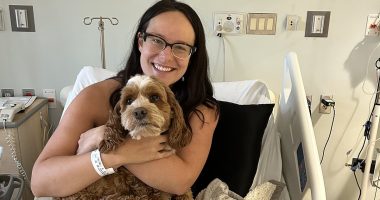Share this @internewscast.com
The birthday party had been an absolute blast – from the gorgeous rooftop venue and endlessly flowing cocktails to a thumping set performed by an Eighties legend.
Little wonder that on waking the next morning, with a slightly foggy curtain effect over my upper right eye, I just presumed the mix of booze and boogying was simply taking its toll.
The effect is still hard to explain, but it was as though I was wearing a pair of glasses with a smudge of dirt covering the top half of my vision in my right eye.
For some time I tried rubbing my eye in the hope that it would go away. And when the distorted vision did not immediately disappear, I dismissed it as something that would pass with my hangover.
What I didn’t know was that this was in fact an urgent warning that my retina – the thin, light-sensitive layer behind the pupil which is vital for vision – had begun to detach. And that without prompt action I could lose my sight.
Thankfully fate intervened. Having lunch later that day with my son, a young doctor, though not in ophthalmology – he insisted that any sudden change in vision needed to be checked immediately.
I reluctantly phoned two very good friends of mine – an eye surgeon and his wife, an optometrist – expecting to be reassured that their daft pal had nothing but a hangover.
Less than 24 hours later I was having sight-saving surgery.
I was told that, had I delayed treatment any longer, I could have become permanently blind in my right eye.

Angela Epstein, pictured with her husband Martin. Just 24 hours after calling her two friends – an eye surgeon and his wife, an optometrist – she had sight-saving surgery

After a night of celebrating and birthday drinks, Angela didn’t think much of the sudden blurriness in her right eye and blamed it on a hangover
Of course, not everyone is fortunate enough to have such strategically qualified loved ones. Which is why it’s vitally important to know the warning signs of a detached retina – a condition that affects nearly 7,000 people in the UK each year.
Such signs involve any significant and often sudden change to vision, explains Niall Patton, a leading consultant ophthalmologist, cataract and vitreoretinal surgeon at the Manchester Royal Eye Hospital and The Wilmslow Hospital, who performed my emergency operation.
For example, floaters in the eye – small specks drifting across your vision – aren’t cause for alarm in themselves. However, any sharp increase in numbers can be a warning sign.
So too is seeing flashing lights in the dark – say at night – as well as the ‘curtaining’ effect I experienced. It’s also important to be aware of risk factors.
‘Retinal detachments are really rare under the age of 40 – the peak age seems to be 50 or 60,’ explains Mr Patton. ‘The vast majority of cases are also in those who are short-sighted or myopic. The believed mechanism is that the myopic eye is longer so the length of the retina is stretched over a larger area. This makes it thinner and more likely to tear, leading to a detachment.’
Previous eye surgery can also increase risk. The detachment itself usually happens when vitreous jelly – a gel-like substance in the eye – spontaneously comes away from the retina, known as a posterior vitreous detachment.
The key is to get seen fast, ideally within 24 hours, by an optometrist, says Jeff Kwartz, consultant ophthalmic surgeon at Bolton NHS Foundation Trust.
‘It’s vital to pick up detachment before the central vision area of the retina, the macular, has been affected. At this early stage, surgery has a greater chance of saving this central vision, – that is, detailed sight.’

It’s vitally important to know the warning signs of a detached retina – a condition that affects nearly 7,000 people in the UK each year
The operation I had took about 45 minutes and was carried out under a combination of general sedation as well as local anaesthetic around the eye.
The procedure involved removing the vitreous gel that had caused the tear. Mr Patton then inserted an air bubble to force and flatten the layers of the retina back together, sealing the area with a laser.
After this he injected a bubble of gas known as SF6 to support the retina during healing.
Happily, I slept through all of this. But in recovery I had to remain in a seated, face-down position for three hours (known as posturing) to help keep the gas bubble in place. Thankfully I wasn’t in pain – and my eye, though red, didn’t look too bad given what it had been through.
What was frightening was that I couldn’t see anything – even close up. Instead everything was thickly blurred, which caused panic to set in – after all, I could see before the operation.
Mr Patton, however, reassured me this was due to the gas in my eye and that my sight would return once it had dispersed. I just had to be patient.
After about a week of wondering when this might ever happen, I noticed a sliver of clarity at the top of my vision, as if I was peeking through a slatted blind.
And over the coming days this expanded.
Two weeks after surgery, the gas bubble was gone – and my sight had returned. I was and am still overwhelmed with gratitude.
The success rate of a procedure such as mine, according to Mr Patton, is 80 to 90 per cent – so I’m banking on these odds.
What I am 100 per cent clear about is making sure people know that sudden changes in vision must never be ignored. It may be nothing – but if it is something, acting fast could save your sight.















